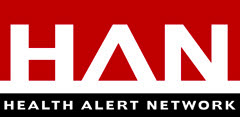
Monday, September 05, 2005, 14:45 EDT (2:45 PM EDT)
CDCHAN-00231-2005-09-05-ADV-N
Guidelines for the Management of Acute Diarrhea
Increased incidence of acute diarrhea may occur in post-disaster situations where access to electricity, clean water, and sanitary facilities are limited. In addition, usual hygiene practices may be disrupted and healthcare seeking behaviors may be altered. The following are general guidelines for healthcare providers for the evaluation and treatment of patients presenting with acute diarrhea in these situations. However, specific patient treatment should be determined based on the healthcare provider's clinical judgment. Any questions should be directed to the local health department.
CHILDREN
Indications for medical evaluation of infants and toddlers with acute diarrhea
∙ Young age (e.g., aged <6 months or weight <18 lbs.)
∙ Premature birth, history of chronic medical conditions or concurrent illness
∙ Fever ≥38 °C (100.4 °F) for infants aged <3 months or ≥39 °C (102.2 °F) for children aged 336 months
∙ Visible blood in stool
∙ High output diarrhea, including frequent and substantial volumes of stool
∙ Persistent vomiting
∙ Caregiver's report of signs consistent with dehydration (e.g., sunken eyes or decreased tears, dry mucous membranes, or decreased urine output)
∙ Change in mental status (e.g., irritability, apathy, or lethargy)
∙ Suboptimal response to oral rehydration therapy already administered or inability of the caregiver to administer oral rehydration therapy
Principles of appropriate treatment for INFANTS AND TODDLERS with diarrhea and dehydration
∙ Oral rehydration solutions (ORS) such as Pedialyte ® or Gastrolyte ® or similar commercially available solutions containing sodium, potassium and glucose should be used for rehydration whenever patient can drink the required volumes; otherwise appropriate intravenous fluids may be used.
∙ Oral rehydration should be taken by patient in small, frequent volumes (spoonfuls or small sips); see below link to table for recommended volumes and time period.
∙ For rapid realimentation, an age-appropriate, unrestricted diet is recommended as soon as dehydration is corrected
∙ For breastfed infants, nursing should be continued
∙ Additional ORS or other rehydration solutions should be administered for ongoing losses through diarrhea
∙ No unnecessary laboratory tests or medications should be administered
∙ The decision to treat with antimicrobial therapy should be made on a patient-by-patient basis, on clinical grounds, which may include
o Fever
o Bloody or mucoid stool
o Suspicion of sepsis
OLDER CHILDREN AND ADULTS
Indications for medical evaluation of children > 3 years old and adults with acute diarrhea
∙ Elderly age
∙ History of chronic medical conditions or concurrent illness
∙ Fever ≥39 °C (102.2 °F)
∙ Visible blood in stool
∙ High output of diarrhea, including frequent and substantial volumes of stool
∙ Persistent vomiting
∙ Signs consistent with dehydration (e.g., sunken eyes or decreased tears, dry mucous membranes, orthostatic hypotension or decreased urine output)
∙ Change in mental status (e.g., irritability, apathy, or lethargy)
∙ Suboptimal response to oral rehydration therapy already administered or inability to administer oral rehydration therapy
Principles of appropriate treatment for ADULTS with diarrhea and dehydration
∙ Oral rehydration solutions (ORS) such as Pedialyte ® or Gastrolyte ® or similar commercially available solutions containing sodium, potassium and glucose should be used for rehydration whenever patient can drink the required volumes; otherwise appropriate intravenous fluids may be used.
∙ Oral rehydration should be taken by patient in small, frequent volumes (spoonfuls or small sips); see below link to table for recommended volume and time period.
∙ For rapid realimentation, unrestricted diet is recommended as soon as dehydration is corrected
∙ Additional ORS or other rehydration solutions should be administered for ongoing losses through diarrhea
∙ No unnecessary laboratory tests or medications should be administered
∙ Antimotility agents such as Lomotil ® or Immodium ® should be considered only in patients who are NOT febrile or having bloody/mucoid diarrhea. Antimotility agents may reduce diarrheal output and cramps, but do not accelerate cure.
∙ The decision to treat with antimicrobial therapy should be made on a patient-by-patient basis, on clinical grounds, which may include
o Fever
o Bloody or mucoid stool
o Suspicion of sepsis
This document is also available online with a table describing the degrees of dehydration at http://www.bt.cdc.gov/disasters/hurricanes/dguidelines.asp
HAN Message Types
- Health Alert: Conveys the highest level of importance; warrants immediate action or attention. Example: HAN00001
- Health Advisory: Provides important information for a specific incident or situation; may not require immediate action. Example: HAN00316
- Health Update: Provides updated information regarding an incident or situation; unlikely to require immediate action. Example: HAN00309
- Info Service: Provides general information that is not necessarily considered to be of an emergent nature. Example: HAN00319
## This Message was distributed to State and Local Health Officers, Public Information Officers, Epidemiologists and HAN Coordinators as well as Clinician organizations ##
You have received this message based upon the information contained within our emergency notification database. If you have a different or additional e-mail or fax address that you would like us to use, please contact your State-based Health Alert Network program at your State or local health department.
- Content source: CDC Emergency Risk Communication Branch (ERCB), Division of Emergency Operations (DEO), Office of Public Health Preparedness and Response (OPHPR)
Get email updates
To receive email updates about this page, enter your email address:
Contact Us:
- Centers for Disease Control and Prevention
1600 Clifton Rd
Atlanta, GA 30333 - 800-CDC-INFO
(800-232-4636)
TTY: (888) 232-6348 - Contact CDC-INFO


